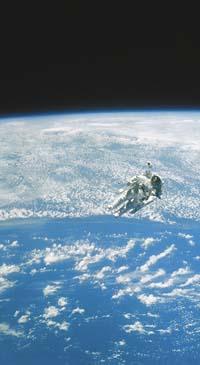Non-existent forces

Floating is nice. At least that seems to us. The one who is floating does not bear pressure, so it seems the paradigm of rest, floating means not having to face any force. When we float we feel it. However, if analyzed closely it is easy to see that floating is not a process without force. Otherwise. Floating means there is more than one force that is balanced. In this sense, perception is not a good advisor.
In space we see the astronaut floating inside the ISS station, the writer, the eater and the drinker floating around. However, this astronaut has not escaped the gravity of the Earth. It does not fall, but it receives the "downward thrust" of the Earth. However, it is also influenced by other forces. And those other forces, and the speed of the ISS station, make gravity offset and the astronaut float.
But all this is because the ISS station is moving within an orbit and at a speed of almost 28,000 kilometers per hour and almost 16 laps around the Earth in one day. If he stood at that height, the astronaut and all the objects inside the vessel would fall. And the whole station would begin to fall, until it hit the earth's surface like anything else.
Therefore, when floating the astronaut does not feel strength because the effect of the forces causing its presence in orbit is to compensate for gravity. In this case, perception is not a good advisor, but sometimes the opposite happens.
Spinning
Sometimes we perceive non-existent forces. Every time we take a curve in the car, for example. The body moves towards the "outside" of the curve, so it seems to us that there is force out. And that perception is very real. We have given it the name of centrifugal force.
However, centrifugal force does not exist. There is no force pushing to the outside of the curve. If the steering wheel is released, the car continues forward and not outwards. On the contrary, it pushes a reverse force, "inward." And that force is also called centripetal force. In the case of the car this force is exerted by the car itself.
Centripetal force is real, it exists. Centrifuge does not exist. However, we attach more importance to our perception than to reality. We call centrifuge the device that works in very fast turn. Perhaps he would need a centripetador.
It also occurs in the scientific field. Other non-existent forces achieve a great presence.
In the case of meteorologists, the example is the strength of Coriolis. Atmospheric air does not circulate through a straight line from a high pressure zone to a low pressure zone. It is turning and thus the swirls arise around the anticyclones and depressions. But why? Because the air has to move a very long distance, it needs time and the Earth rotates during that time. The air follows a straight line, but if you look at a map it seems to move in a curve because the area representing the map is moving. It is a reference point problem.
Add to this the movement of these high and low pressure zones. These areas are not stopped, the atmosphere is not a mass of air in balance, so very complex movements of air (and clouds) are generated.
In this movement the Earth movement is not a force. Coriolis force does not exist. On the contrary, it is an effect.
And a very important effect. Coriolis is an effect to take into account not only in meteorology, but in many other areas. It is very important to plan specific flight routes for aircraft, for example.
There is, therefore, the difficulty of taking the measure. The centrifugal force and force of Coriolis (and other forces) are not real forces. They cannot be used in physical calculations because they do not exist. The effects they produce are real. And known and useful.
Without a doubt, human perception depends on them. In the end, perception is a tool that helps us understand the world. The point is that you have to know the limit of this tool. Knowing this, there are no problems using it.





